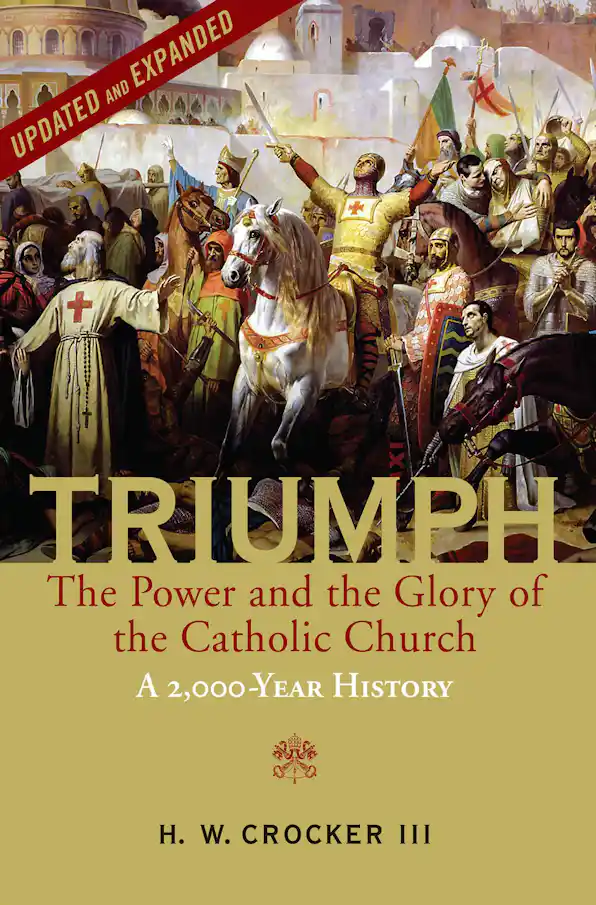There’s a great line by St. John Henry Newman that Catholic apologists like to quote, particularly in debates with Protestants: “To be deep in history is to cease to be Protestant.” Among the strongest reasons to become Catholic is realizing how the Church continued to exist and thrive over the course of over two millennia, making it the oldest continuous institution on the planet. Surely, a divine force is working through the Church’s members, driving them to spread the Gospel and build up God’s Kingdom.
Recognizing and celebrating this miracle, H. W. Crocker III has just published an updated edition of his history Triumph: The Power and the Glory of the Catholic Church. At a time when so many Catholics either ignore their own history or apologize for it, Crocker takes great pride in examining the great personages and achievements of the past.
True to his title, he shows how the story of the Church is one of amazing triumphs in realizing humanity’s potential and being a tremendous force for good. Properly told, it’s a story that will inspire the faithful and, let’s hope, convert nonbelievers.
As Crocker demonstrates, the most important aspect of writing a comprehensive history of the Church is to make it readable. Unlike most modern histories that either revise events to fit a certain lens (e.g. “a Marxist take on the Sicilian Vespers”) or contextualize their subject into oblivion (e.g., “St. Joan of Arc was the product of impersonal economic and social forces in 15th century France”), Triumph offers a clear and understandable narrative, featuring a diverse cast of movers and shakers throughout the ages.
To this end, Crocker focuses on the men who fought great battles on behalf of the Church. Sometimes he will write at length about saints like Athanasius, Thomas More, Ignatius of Loyola, or John Paul II, but he will devote even more pages to sinners like the Roman Emperor Constantine, the Holy Roman Emperor Charles V, or “L’Empereur” Napoleon Bonaparte. Even from the outset, before mentioning Jesus and His Apostles, Crocker can’t help but describe Constantine’s momentous battle with Maxentius in his prologue, his first sentence functioning like the voice-over of an action movie, “Perhaps the legions had grown overconfident.”
While displaying an obvious preference for certain historical figures, Crocker nevertheless succeeds in covering all of the great moments along with many of the small ones in the Church’s history with impressive detail and drama. Some of the best parts of Triumph happen when Crocker describes some of the lesser-known episodes in Catholicism, like the guerrilla warfare campaigns of the Teutonic Knights in the Black Forest, the hectic reigns of the Avignon popes, the wars between Catholics and Puritans in the Netherlands, or the tragic decline of Mexico, a society that was once “a more advanced, older, better-educated, and devout civilization than the United States.”
Crocker also shines when engaging with the biased conclusions of other historians. He defends the Renaissance popes as men well suited to their time: “The Renaissance popes were men who had to navigate the political world captured in Machiavelli’s The Prince.”
He does the same for the Church’s inquisitions during the Middle Ages: “One of the very reasons the Church involved itself in these matters of secular law was so that the secular authorities would not act arbitrarily or use laws of heresy merely to punish their enemies.”
He also sets the record straight with the twentieth century popes, specifically Pius XII who has been accused of supporting the Nazi agenda despite the fact that “outside the Allied armies, [he] did more during World War II to save Jewish lives from the Holocaust” than anyone else.
As one might expect, Crocker is clear about whom he believes are the villains of history. Head and shoulders above them all is Martin Luther, who incited the Protestant rebellion that broke Christendom. From the Thirty Years War to the French Revolution to World War II, Luther is repeatedly condemned as the originator for all of it.
In second place are the emperors and patriarchs of Byzantium, who politicized the faith, violently resolved heresies through government crackdowns (making their people willing converts to Islam), and constantly exhibited an ugly combination of effeminacy and duplicity in their politics.
Interestingly (and controversially), Crocker treats the opposing forces of Islam and the secular ideologies as natural consequents of these breaks with the Catholic Church, which is why he seems to go easier on them despite their much larger body counts. This also explains why he reserves his praise for leaders who win wars, show strength, and rule competently over those who display great piety and a willingness to compromise. Personal holiness and innocence tend to become liabilities when facing off with the harsher world actors.
All this is to say that non-Catholic readers, at least the more serious ones, may not appreciate Crocker’s overall approach to his subject matter. It’s confrontational, non-academic, and often mocking. He has little interest in preserving an “objective” tone or drowning his readers in nuance and boring them with unresolved complexities – though his scholarship is quite sound, as shown by the 60 pages of endnotes and frequent quotations from primary sources.
Rather, he succeeds in something much more persuasive and helpful: recounting over 2000 years of history in one concise 550-page volume. For those hoping for a primer on Western history from the Roman Empire onward or for those needing a refresher on the topic, Triumph is an excellent resource, approaching the level of a classic. Even for those who have a deeper background in history, Crocker’s style and wit breathe new life into these discussions and offer some new perspectives.
Most importantly, Triumph succeeds in rekindling a deep love (or begrudging respect) for the Catholic Church and what it has overcome. For all its flaws and foibles, it is still the great light in an otherwise dark world.
















